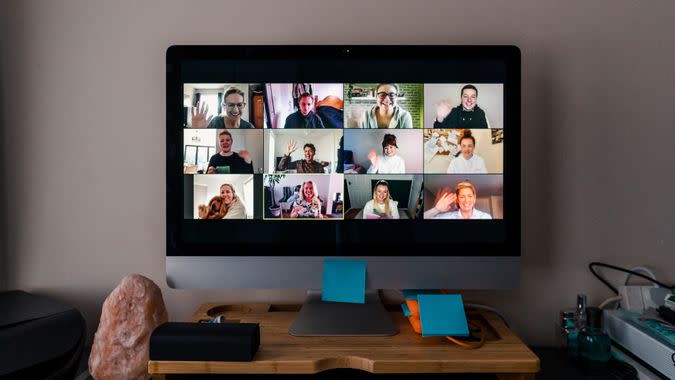Smart Ways You Can Prepare For Job Loss While You’re Still Employed

At the peak of the pandemic, approximately 44.2 million people filed for unemployment during the shutdown in the U.S., according to the U.S. Department of Labor. If your employer is struggling to stay afloat in the COVID-19 pandemic, you’re probably concerned about your job.
Find Out: How To File for Unemployment and What To Do After Losing Your Job
Discover: 24 Tips To Change Your Career and Land Your Dream Job
Preparing for a possible pink slip in your not-so-distant future can help you find a new job faster and stay afloat financially in the interim. In order to brace yourself for job loss, take these steps now.
Last updated: July 21, 2021

Update Your Resume
If your resume is updated, you’ll be able to start applying for jobs the day you’re laid off. You’ll need to customize it for each position, but having a generic version ready to go will be a huge start.
This is the first impression you’ll make on potential employers, so take the time to create a polished and professional document. Most employers (77%) cite typos or bad grammar as an instant deal breaker and 34% aren’t interested in resumes without quantifiable results, according to CareerBuilder.
See: 40 Legit Companies That Will Pay You To Work From Home

Reach Out to Your Network
Over the years, you’ve made a lot of connections in your industry — and now is the time to leverage them. Reach out to former managers, colleagues, clients, classmates and friends to see if they know of any openings that might be a good match for you.
If you don’t want your current employer to know you’re seeking new opportunities, ask them to exercise discretion.
Read More: 5 Things To Negotiate at Your Job Other Than Salary

Take On a Side Hustle
A traditional full-time job isn’t the only way to earn money. Finding alternative ways to earn cash now can help you pay the bills if your steady paycheck disappears for a while.
When it comes to side gigs, the sky’s the limit. You could leverage skills from your current job — like an accountant might become a tax preparer — or find a part-time job — such as delivering pizza on the weekend.
Find Out: How To Interview For a Job When You’re Wearing a Mask

Start Thinking of Places You’d Like To Work
A new job is a big deal, so avoid having to make a rush decision by making a list of employers you’re interested in. Use the company website, blog and social media presence to learn more about what they do, the company culture and possible roles for you.
Having this list on hand will make it easier to know where to turn if you find yourself without a job. Being one step ahead can help you get hired faster and increase your chances of landing in a place where you’ll be truly happy.
Banking: Top 100 Banks Leading the U.S. in 2021

Take a Continuing Education Course
More than half (56%) of employers offer tax-free tuition assistance to employees, according to the Society for Human Resource Management. If your employer offers continuing education benefits, take advantage of them now.
Enroll in an online course you can complete relatively quickly and that will make you a more competitive candidate. You could also start a degree program you might not be able to complete before you lose your job. This will show potential employers you’re ambitious while paving the way to a brighter future.

Make New Connections on LinkedIn
It’s almost inevitable that you have a LinkedIn profile, but you might not be maximizing its value. As the world’s largest professional network, LinkedIn has nearly 690 million users in more than 200 countries, so there’s a solid chance someone on the site holds the key to your dream job.
Make sure your profile is complete, then search for people you’d like to get to know. Zero in on those working in your industry, in your local area and at companies you’re interested in. Send a personal note with your connection request to increase the chance of having it accepted and truly building a bond with the person.

Start Applying For Jobs
Hiring decisions aren’t made overnight. In fact, it takes companies an average of 36 days to fill an open position, according to the Society for Human Resource Management (SHRM).
If you feel like your current job situation is unstable, getting a head start on your search can reduce the amount of time you’re unemployed, if you do lose your job. If you’re offered a new job before you actually lose your current one, getting ahead of the situation can help you avoid having to be unemployed at all.

Line Up References
There’s a common misconception that potential employers don’t actually perform reference checks, but that isn’t the case. Nearly all employers (96%) conduct at least one type of employment background screening, according to HR.com.
Prepare for this now by deciding who you’d like to speak on your behalf. Unless otherwise noted, references need to be professional in nature and should be limited to people you’ve worked with directly, such as former managers, colleagues, clients or teachers.
Only choose people you have a good relationship with, who you’re certain will sing your praises. Since being a reference requires both a time commitment and sharing their contact information, always ask permission before adding someone to your list.

Check In With a Previous Employer
Assuming you left on good terms, contacting a former employer to see how the business is weathering the pandemic can be a good move. Let them know you’re concerned about your current job and ask to be kept in mind if any positions you would be qualified for open up.
Savvy employers know great talent is hard to come by, so if they’re able, they’ll likely jump at the chance to have you back on the team. Only make this move if you plan to stay for the foreseeable future, as jumping ship when things calm down will almost definitely burn bridges.

Create a Portfolio
Portfolios are more prevalent for job seekers in some industries than others, but they can be helpful to everyone. Submitting a portfolio with your application allows you to put your money where your mouth is, where your skills are concerned. It also demonstrates enthusiasm for the position.
Some things to put in your portfolio include letters of recommendation or reviews about yourself, work samples and awards and accomplishments, according to Indeed. You can also add things like educational transcripts, a skills list — separated into hard and soft skills — and biographical information.

Research Financial Assistance Programs
If you lose your job, you’ll likely be eligible for a variety of financial assistance programs. Learning about your options now will allow you to spring into action immediately if you’re laid off.
Each state sets its own unemployment guidelines, so find out eligibility criteria for your state. Do note, the Coronavirus Aid, Relief, and Economic Security (CARES) Act offers enhanced unemployment benefits — including an extra $600 per week for up to six months.
You might also qualify for additional government assistance, including SNAP — Supplemental Nutrition Assistance Program — benefits and free or discounted health insurance through the Affordable Care Act.

Reach Out to a Staffing Firm
When many companies need to hire, they partner with external recruiting firms to fill open positions. Many of these opportunities are never posted publicly, so you won’t hear about them unless you’re on a recruiter’s radar.
In addition to connecting you with exclusive opportunities, recruiters can also help you become a more competitive candidate. As hiring experts, they know what employers want, so their advice can help polish your resume and prepare you for interviews.
Plus, if you end up using their services, you probably won’t pay a dime, as most firms don’t charge candidates.

Consider a Temporary Career Change
It’s hard to know what the world will look like when the pandemic is over. However, if you lose your current job because your industry was hit hard by the effects of COVID-19 — like in the case of restaurants, entertainment and travel — you might consider a temporary shift into another field.
This move doesn’t have to be forever, but shifting into a more essential industry will help you pay the bills in the interim. It will also allow you to avoid a resume gap and expand your skillset, so you’ll be a more competitive candidate when normal life returns.
Change of Scenery: 16 Key Signs It’s Time for a Major Career Change

Google Yourself
It’s very likely that potential employers will Google you during the hiring process. If they don’t like what they see, this will likely ruin your chances of getting hired.
Get one step ahead by Googling yourself before you start applying for jobs, so you can see what you’re working with. If the results aren’t great, you can try going straight to the source and asking them to remove negative content.
When you’re unable to have negative content removed, pushing it down in search results is your next best option. Start a website or blog using your name, as this type of content tends to rank well. You can also create profiles on high-ranking sites like Twitter, Pinterest and Tumbler to bury the less-than-flattering content.

Put Personal Social Media Accounts on Lockdown
Seventy percent of employers use social networking sites to research candidates, according to CareerBuilder. Of this group, 57% have found information that caused them not to hire candidates.
Some of the top reasons candidates weren’t hired were inappropriate content (40%), information about them drinking or using drugs (36%) and discriminatory content (31%), according to CareerBuilder.
The last thing you want is to miss out on a great job because a hiring manager doesn’t approve of your social media presence. Avoid this by enabling strict privacy settings on all profiles used for personal purposes.

Create a Professional Social Media Presence
Nearly half (47%) of employers say they’re less likely to interview candidates they can’t find online, according to CareerBuilder. Specifically, 58% of employers who use social media to learn more about candidates want to find information that supports their qualifications for the job.
A few key features employers want to see include background information that aligns with their professional qualifications (37%), creativity (34%) and a professional image (33%).
It’s clearly important, so choose one or two social media platforms relevant to your industry and create a professional presence. Take the time to post regularly, so potential employers view you as an engaged and ambitious professional.

Join a Professional Association
Membership will likely come with a fee, but if you can swing it, you’ll get your money’s worth. A professional association relevant to your industry offers many benefits, including career resources, networking and learning opportunities.
Get the most from your membership by taking advantage of every available resource. Right now, this might involve virtual happy hours, webinars and online resources to help improve your resume.
Don’t forget to list your membership on your resume to impress potential employers.

Start an Industry-Focused Blog
Employers want ambitious candidates who are truly passionate about their work. Starting your own industry-focused blog is a great way to showcase your expertise, boost your positive SEO results and highlight your writing skills.
In fact, if it becomes popular, your blog might even attract potential employers on its own. Post new content regularly, focusing on topics like industry trends, projects you’re working on and insights on what it’s like to work in your field.

Use Your Alma Mater’s Alumni Resources
Most colleges and universities have a career center for new graduates, but many also extend their support to alumni. Offerings vary by school but might include access to exclusive job postings, the ability to join a private networking database and invitations to career fairs and networking events — of course, all virtual right now.
Apply: 30 Jobs That Aren’t Worth Their Education Requirements

Look For Ways To Reduce Expenses
It goes without saying that if you lose your job, money will be tight for a while. Start preparing now by searching for ways to trim your budget.
This might include omitting more obvious expenditures like cable and subscription services, but you can get more creative than that. Shop around for cheaper rates on essential expenses like car insurance and your mortgage — if you think you could refinance before losing your job.
Living as frugally as possible will help you stretch your money as far as possible, so you can limit — or completely avoid — debt if you’re unemployed for a bit.

Put Aside Money You’re Saving by Being Home All the Time
Working remotely is typically a lot cheaper than working outside the home. If you’re only in this position because of the pandemic, you’re likely saving money.
Not having to pay any fees associated with commuting — such as gas, parking or your bus pass — eating lunch at home and not having to buy new work clothes adds up fast. Add in the savings associated with being homebound in your free time — like your savings on no dinners with friends, trips to the movies or haircuts — and you probably have some extra cash.
Take advantage of the wiggle room in your budget by preparing now for a possible job loss. Put the money you’re not spending aside in savings, so you’ll have an extra cushion if you find yourself unemployed.

Put Your Stimulus Check in Your Emergency Fund
As a general rule, you should have at least three to six months’ worth of expenses in your emergency fund, according to Wells Fargo. If you don’t have this much put aside — or don’t have an emergency fund at all — now is the time to start one.
If you received stimulus payments and can afford to do so, put them in your emergency fund as a smart move for your future. Hopefully, you won’t need to use it, but if you do, this will help you stay afloat financially until you’re able to find a new job.

Know Your Worth
You’re a talented professional who will bring a lot to any employer. It’s important to know your worth, so you don’t undervalue yourself if you’re forced to look for a new job.
The Bureau of Labor Statistics offers wage data for more than 800 occupations in approximately 400 industries. The information is available for more than 500 metropolitan and nonmetropolitan areas.
This data allows you to gauge average salaries for your target job, in your local area. Use it to create salary expectations that ensure you’re paid fairly.

Volunteer Your Time
These days, you’re pretty much always home, so dedicate your newfound free time to a good cause. Virtually volunteer your career-related skills to a nonprofit organization that needs you.
For example, Translators Without Borders needs translator volunteers and the Crisis Text Line needs volunteer crisis counselors.
Giving back will make you feel good and you might even learn a few new skills. Plus, you can put this experience on your resume to impress potential employers.

Take Advantage of Outplacement Benefits
Find out now if your current employer offers outplacement benefits. If so, take advantage of this key part of your separation package.
Some of the services commonly offered through outplacement firms include career guidance and coaching, interview preparation and resume and cover letter writing. Don’t brush this opportunity off, because it’s a chance to get a head start on your job search, at no cost to you.
More From GOBankingRates
This article originally appeared on GOBankingRates.com: Smart Ways You Can Prepare For Job Loss While You’re Still Employed

